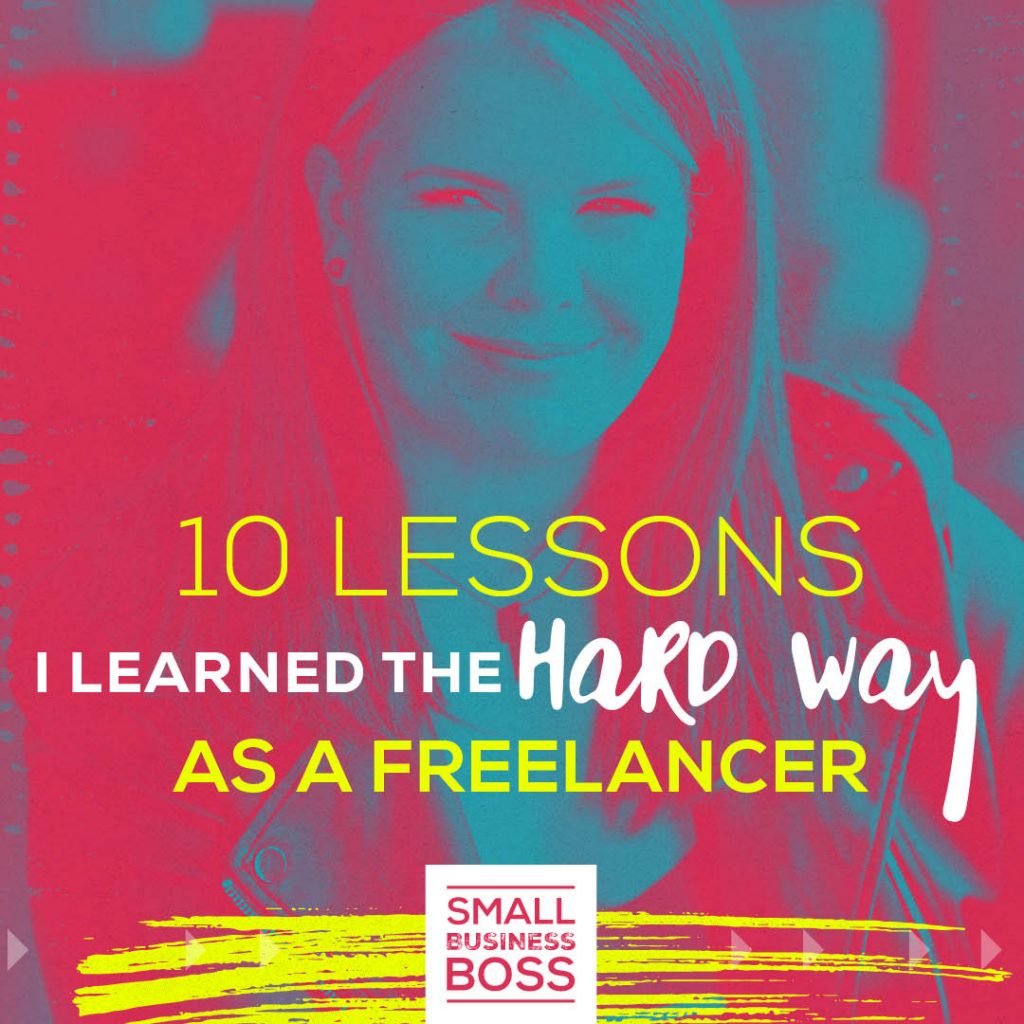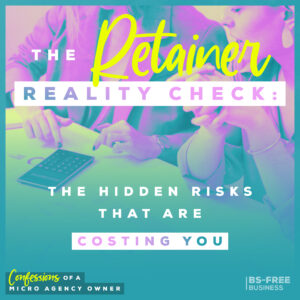
Search the site:
Episode 182: 10 Lessons I Learned the Hard Way as a Freelancer
Back in 2005, when I decided to quit my job and start my own business, little did I know how much owning my own business would push me as a person and teach me countless lessons. As a freelancer, a lot of those lessons were hard, uncomfortable, and at times, incredibly stressful, so in this episode, I’m going to share 10 lessons I learned the hard way. Consider this my gift to you as a boss — no matter where you are on your journey — to help save you the suffering.
When I decided to focus on freelancing this month, I spent a lot of time considering what I could add to the conversation. I mean, there’s no shortage of conversations about freelancing, so I wanted to go beyond the tactics and share some things that were not only personal but critical to who I am today — both as an agency owner and someone who mentors other service business owners.
With that, I bring you my 10 lessons I learned the hard way with some stories and a bit of practical guidance from my actual experience you can take away and apply today.
Table of Contents
Lesson #1: You’re Not 7-11
Everybody loves 7-11 for when you need an emergency gallon of milk or bag of popcorn. It’s easy, it’s convenient, and it never, ever closes — which is great if you’re hankering for a Slurpee, but it’s downright terrible if you’re running a business.
Early on in my business, I made the mistake of being simply too available, and at times, being available when I really didn’t need to be. In a few cases, this created an unrealistic expectation about response times and made clients think I literally was at their beck and call.
I was the 7-11 of freelancers, always ready to answer an email or save the day no matter what. Eventually, I noticed that I was mistaking the idea of being of service to my clients with being way too available.
As much as I don’t like playing games, there’s a lot to be said for playing a bit hard to get. Don’t jump on every email just because you can. Don’t say yes to every crazy last minute request as it’s really not that big of a deal. You need your clients to respect your boundaries, and most of all, not take you for granted.
Lesson #2: You’re Not a Buffet in Vegas Either
The very first time I went to Vegas, people kept asking if I was going to hit up the buffets. I was puzzled by the fixation on buffets, as let’s face it, I’m not a superfan of a place where random people can touch the food I might eat.
Then I realized why people like buffets in Vegas. First of all, they’re cheap. But more importantly, people love that they have so many options. Chinese! Italian! Ice Cream! If there’s one place you can have it all, it’s at a buffet in Vegas.
Which brings me to business. I’ve definitely had times in my business where I was like one of those unfocused buffets with every type of cuisine you could imagine. As someone with a diverse skill set, it became really easy to say yes to things clients wanted because I could do them.
And guess what happened? I wasn’t happy. The work kind of sucked, and it was easy for expectations to balloon out of control.
Boss, that’s no way to run a business. You’re not a buffet. Pick a few services, and do them really well. Become a specialist at what you do and master it. That will help you land quality clients who aren’t looking for all-you-can-eat buffet prices.
Lesson #3: You Need More People to Talk to Than Your Cat
I honestly believe you can’t have enough support in your business as it’s incredibly easy to become isolated — especially if you work from home. You can spend the day talking to no one but yourself and your pets, and while that’s good for a while, it’s not a long-term plan.
About six or seven years ago, I found myself feeling increasingly alone in my business. My long-time freelancing friend had gone back to a 9-to-5, and I really didn’t have anyone to talk about my business with. Add in living in the country and having a school-age child, it was easy to go days on end without talking to anyone but my immediate family.
Now, this story could have gone one of two ways, and I think you know which way it did go. I decided to cut it out and go make some business friends. To hire a coach. To connect in business communities. Basically, to ditch my hermit act.
Honestly, I could have just continued to do my solo, solitary thing, and I fully believe that it would have had a negative impact on my life if I’d done it much longer. In short, you need a support system of people who “get” your business, and most of all, it’s okay to ask for help.
Lesson #4: You’re Not Visa or Mastercard
As a freelancer, one thing I did was give way too much power to my clients when it came to paying me. I billed at month-end, and then waited 30, or even 60 days to get paid. I’d roll with whatever the client’s payment policy was because I was just so happy to be getting paid.
The problem with this payment model is that you’re extending credit to your clients. You’re incurring all of the risk by doing the work and waiting to get paid. The issue being is that there’s no 19.99% interest rate if they don’t pay on time, and if they decide to screw you over, there’s no hit to their credit rating.
My business — and my stress level — improved significantly when I started asking clients for payment upfront. The funny thing is that I didn’t even realize this was an option until one day, I looked at my cash flow and thought, “Nope, not doing this anymore!”
And if you’re worried about clients running from you because you want payment upfront, my experience is that asking for payment upfront typically isn’t an issue for quality clients. If they can’t do payment upfront, it gives you a starting point for payment terms that are more favorable than net 60.
Lesson #5: Lock Down Your Legal
I know, legal can be scary for a lot of us because it’s confusing and expensive or something we’d rather not handle. But I’ve never regretted a single penny I spent on lawyers.
For years, I used an incredibly basic contract, and quite frankly, my ass wasn’t covered. It’s a miracle this didn’t land me in hot water at some point. And while I didn’t end up with a legal disaster, there are a lot of things I did run into, such as challenges from excessive delays to scope creep, that could have been easily handled with the right contract in place.
Today, my client contracts exist to lay the groundwork for how we engage and what’s expected. If need be, I’m able to refer back to things, like the delay clause, work that’s out of scope, or any other scenario I’m not a fan of.
Make the investment in a contract that protects you. It doesn’t need to be fancy, but it does need to be legit, so it’s binding.
Lesson #6: Your Clients Are NOT Your Boss
When I made the jump from employee to freelancer, I was trained into having a boss, so it was pretty natural that I started thinking of each of my clients as my boss. The problem is that having five bosses, well, that’s not any way to live.
Not to mention that this approach gave away a lot of my power as a freelancer. Instead of showing up as an expert, I showed up as an employee, and that wasn’t always the best situation.
You have one boss now, and guess what? That boss is you. You have sovereignty over what you do on a day-to-day basis, and you should be partners with your clients. The goal should be to be of service but to make things a win-win for you. Don’t say yes to everything. Push back as needed, and be a freakin’ boss.
Lesson #7: Don’t Put Your Eggs All in One Basket
Over the years, I had a tendency to have one bigger anchor client, and then a series of smaller clients. That anchor client would be about 70% of my total monthly revenue and was where I’d focus most of my energy.
That approach was easy but it created a power imbalance where I had a lot of fear about that client leaving. And when it was time for that client to go, it was damn near catastrophic for my business.
I always bounced back, but it’s a great lesson in not putting too much into a single client and ensuring you have a diversified client list. If you’re not sure, look at the past year of revenue and figure out how the percentages break down. If you’re ever in a situation where any one client is 50% or more of your revenue, I’d look for ways to diversify a bit so you can manage risk.
Lesson #8: Don’t Be Afraid to Raise Your Prices
I didn’t know it at the time, but the eight years I spent freelancing, I lived in a lot of fear. And one of my biggest fears was that I’d lose a client if I raised my prices.
So I didn’t raise my prices. I charged the same rate for eight years in a row.
That seems completely ridiculous to me now, as there’s no way I’d stay in a job where I didn’t get a raise for eight years, but fear let me just coast and avoid raising my prices.
And here’s what’s interesting. That fear was completely unfounded. I’ve lost a grand total of one client EVER due to raising my prices, and honestly, I don’t think that situation was about the price at all.
Make a plan for how to raise your prices today. Because a thoughtful, well-timed price increase is a great way to quickly generate more revenue in your business without any additional work.
Lesson #9: You Can’t Care More About Your Client’s Business Than They Do
I’m sure you’ve been there with a client who wants you to pretty much do their job for them or run their business. This is particularly rampant in what I call the “business to entrepreneur” market as people think hiring help means they’re getting a business in a box. So if you work with these types of clients, just know, this can be a real problem.
I know for me, as I have integrity, I would always try so hard for these clients, but it wouldn’t matter what I’d do, it wouldn’t meet expectations. Mostly because those expectations, no matter how carefully I managed them, were completely whack.
If this sounds familiar, you need to stop caring so much. It may sound callous, but it’s a no-win situation. You can’t care more about the client’s business than they do, and unless they’re willing to cut you into the action, think carefully about how you’re working with them.
Lesson #10: You Don’t Need to Take Anyone’s Shit — Ever
I talk a lot about boundaries, but there have definitely been situations I faced as a freelancer that were way beyond a boundary situation and more about the client being a completely horrible person. Or worse yet, downright abusive.
Luckily, I’ve got zero tolerance for clients who behave poorly, and I have no problem cutting them off quickly. I mean, I once told a client that if their CEO swore at me one more time, I was out of there. And when that CEO called me during dinner and let it rip, they were terminated within a matter of minutes.
Clearly, this was an extreme situation, but we need to protect ourselves against the ones that are a bit more subtle. I’m talking passive-aggressive commentary, consistently dismissing your contributions or counsel, or is simply unreasonable — you don’t need to take that.
It’s never okay, and it’s definitely not part of the gig.
There’s one lesson I didn’t get into in this episode, which we’re going to jump into an episode later this month that is all about sales. Because let’s face it, sales isn’t something that comes easily to all of us.
I genuinely hope you enjoyed these lessons and that you find at least one lesson you can take away and apply to your business starting today.

I’m Maggie Patterson (she/her), and services businesses are my business.
I have 20+ years of experience with client services, am a consultant for agency owners, creatives, and consultants, and vocal advocate for humane business practices rooted in empathy, respect, and trust.
Read or Listen to the Latest
For Solo Business Owners

Growing a solo service business is tough.
It’s even harder when you’re bombarded with BS advice that steers you away from your values and why you started your business in the first place.
This is the podcast for solo creatives and consultants who want to remain as a team of one and have zero interest in the hustle and grind of typical business teachings.
Subscribe now and never miss an episode.
For Micro Agency Owners
Most podcasts for agency owners obsess over revenue growth as the ultimate success metric.

But here’s the truth: not everyone wants to make millions. Your goal might be to build a sustainable business that lets you have a life and doesn’t run you into the ground.
Join me as I spill my shameless confessions and share everything I’ve learned about building a micro agency that skips the BS of tired and typical agency teachings.
Follow Now on All Major Podcast Platforms








